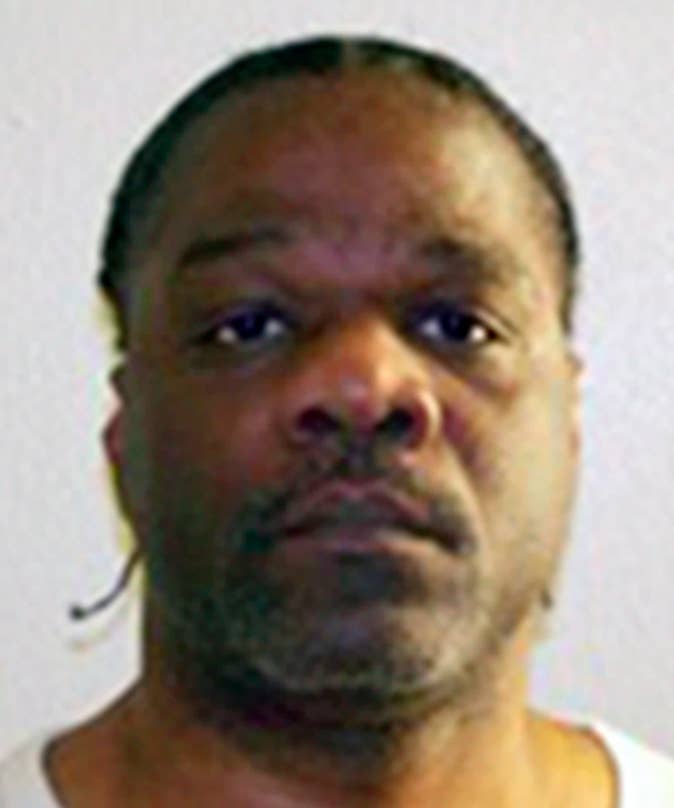
WASHINGTON — Arkansas officials on Thursday evening carried out the state's first execution in more than a decade — putting Ledell Lee to death minutes before the death warrant was due to expire at midnight.
The execution was supposed to begin at 7 p.m. Central Time, but three temporary court orders — issued amid a series of challenges to the state's execution drugs and death penalty process — pushed back the execution to the last 30 minutes of the day.
Lee, convicted in the 1993 murder of Debra Reese, remained uncertain of his fate into the night, as state officials fought to carry out one of four executions the state had scheduled for this week.

It was past midnight in Washington, with less than 45 minutes left on the death warrant for Lee, when the US Supreme Court denied his final five requests to stop his execution.
At 11:30 p.m. CT, an Arkansas prisons' spokesperson told reporters, "We will begin the process of carrying out the sentence of Ledell Lee."
A prison spokesperson told reporters the execution took just 12 minutes: The first drug was administered at 11:44 p.m. CT and Lee's time of death was 11:56 p.m. CT.
Although the final filings prompted no noted dissents from any of the justices, an earlier decision — in an Eighth Amendment challenge to the state's execution drug protocol — split 5-4, with the four liberal justices voting to stop his and other Arkansas inmates' executions. The vote was the first apparent 5-4 split decision of the court since Justice Neil Gorsuch began hearing cases at the court at the beginning of this week.
The seventh execution in the country this year, Lee's execution was the first across the nation in more than a month. It was the first execution carried out in Arkansas since November 2005.
It was, however, also a sign of the difficulty that states face in carrying out executions. Lee was one of four people in the state scheduled to face execution this week, but all of the other executions were halted by the courts.
The other scheduled Thursday execution in Arkansas — that of Stacey Eugene Johnson — was stayed by a Wednesday ruling of the Arkansas Supreme Court.
Johnson, convicted in the 1993 murder of Carol Heath, received a stay of execution from the court on Wednesday. A motion for reconsideration was denied Thursday, and Arkansas Attorney General Leslie Rutledge said she will not seek US Supreme Court review at this time.
The state's high court also, however, stayed a lower court's injunction on Thursday afternoon that was preventing the state from being able to use one of the three drugs it uses in its execution protocol. The move allowed the state to move forward with preparations for Thursday night's scheduled execution of Lee.
A reporter from TVH-11 in Little Rock noted that witnesses were being taken in vans to the execution site from the holding area a little past 6 p.m. in preparation for the scheduled execution.
Moments before the execution was scheduled to begin, however, the US Court of Appeals for the Eighth Circuit issued a temporary stay of execution until 8:15 p.m. CT to consider a pending appeal relating to Lee's ability to prove that he had an intellectual disability. Arkansas opposed that stay request.
At 8:15 p.m. CT, the US Supreme Court — Justice Samuel Alito, specifically — stepped in by issuing a stay of execution for Lee until 9:30 p.m. ET "or pending further order of the undersigned [Alito] or of the Court, whichever is later."
Moments later, the Eighth Circuit extended its stay until 9:15 p.m. CT. By 9:15 p.m. CT, however, the court had denied a series of requests for a stay of execution.
From then on, all eyes were on the US Supreme Court — as all of Lee's other requests at relief from lower courts had been denied. The temporary stay entered by Justice Alito continued until the US Supreme Court denied all of the remaining requests a little before 12:30 a.m. ET Friday.
The scheduled Thursday executions of Lee and Johnson were supposed to be the second of four days this month in which Arkansas would be carrying out two executions.
The Wednesday order halting Johnson's execution on a DNA-related claim, however, was issued by a now-familiar 4-3 split of the state high court. Justices Karen Baker, Shawn Womack, and Rhonda Wood dissented. The same 4-3 division stayed the executions of both men due to be executed on Monday of this week.
The Arkansas Supreme Court denied Lee's three requests, including a DNA-related claim, on Thursday afternoon. In response, lawyers for Lee filed a lawsuit in federal district court, seeking a stay of execution and a ruling that Arkansas' DNA testing statute, as construed by the Arkansas Supreme Court, is unconstitutional.
In addition, Lee and the other inmates pressed appeals on issues relating to the state's use of the sedative midazolam in its three-drug protocol, the clemency process being used by the state in conjunction with the April scheduled executions, and the timing of the executions themselves.
The Eighth Circuit, in a 7-1 decision, rejected the clemency process appeal on Thursday evening.
Later Thursday evening, the Supreme Court rejected stay requests in three different petitions brought previously by multiple Arkansas death-row inmates — although one of them, coming out of the case challenging the state's use of midazolam in its protocol as a violation of the Eighth Amendment, prompted the four liberal justices to dissent from the court's stay denial.
Two of the justices — Stephen Breyer and Sonia Sotomayor — wrote separately in dissent to express their frustration both with the state's process and the court's inaction in the case.
Three additional requests to the Supreme Court seeking a stay for Lee were filed Thursday evening, and the four inmates involved in the clemency process appeal at the Eighth Circuit — including Lee — sought Supreme Court review of that case and stays of execution. A final request, regarding DNA testing, also was filed with the court late Thursday after the Eighth Circuit denied Lee's request on the issue.
Eventually, however, all of the requests were denied — and Lee's execution went ahead.
The next scheduled executions — of Jack Jones and Marcel Williams — are set for Monday, April 24.
Arkansas Gov. Asa Hutchinson in February ordered the executions to be scheduled before the end of April. The scheduling was necessary, the state has claimed, because its midazolam supply expires at the end of the month.
At the beginning of the day Thursday, things had looked good for the inmates — as a state trial court judge, Circuit Judge Alice Gray, had issued a temporary restraining order on Wednesday evening preventing the state from using the vecuronium bromide it purchased from McKesson Medical-Surgical in its executions.
Vecuronium bromide is the second of three drugs used in the state's protocol. (Potassium chloride is the third drug in the state's protocol.) The company claims the state purchased the vecuronium bromide under false pretenses. McKesson contractually bars drugs it sells from being used in executions.
Gray found that the state acted in bad faith and that the company is likely to succeed in its lawsuit. As such, she granted the TRO — at the hearing on Wednesday and in a written order issued a little before noon Thursday. Without the use of the drug, Arkansas would not be able to carry out executions unless it obtains a replacement drug for its protocol.
Rutledge's office, however, filed its notice of appeal with Gray's court 15 minutes later. Before the written order was even filed, moreover, the state asked the Arkansas Supreme Court to step in. Once the written order was filed, the state asked for an emergency stay of that order. McKesson opposed the requests.
After quick briefing from both sides, the Arkansas Supreme Court issued a stay of the injunction — meaning the state could use the execution drugs — while the appeal is heard.
The move set off the flurry of filings on the other issues, as defense lawyers desperately sought for an argument that would keep Ledell Lee alive past midnight.
Ultimately, however, they could not find a court that would do so.
